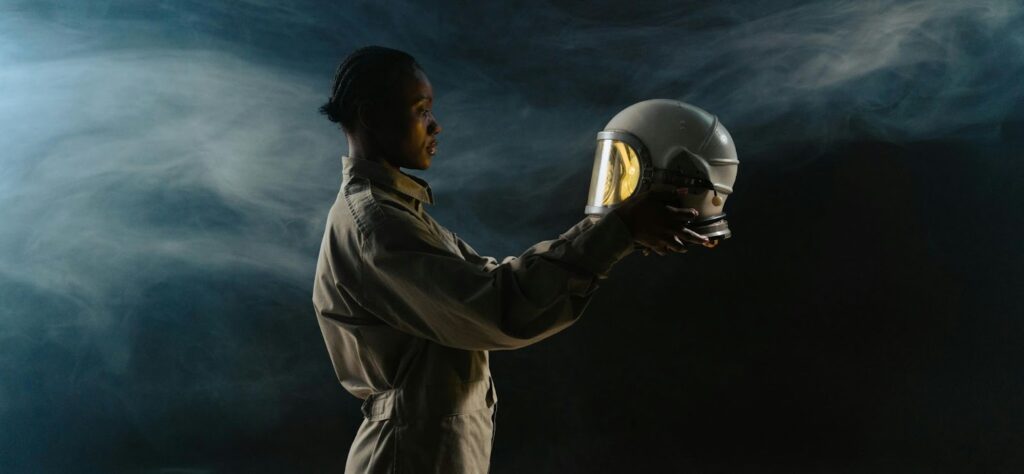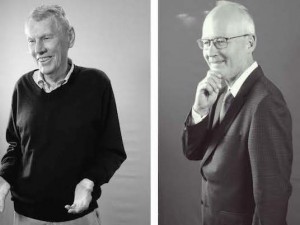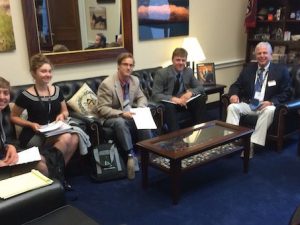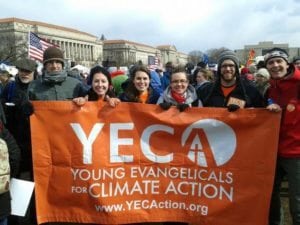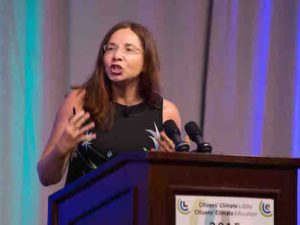Episode 100: Climate Adaptation and Jobs of the Future with Doug Parsons
Our 100th episode of Citizens’ Climate Radio focuses on climate adaptation and how it’s shaping new career paths. Doug Parsons, host of the America Adapts podcast, join us and shares his insights on the urgent need for adaptation and the exciting opportunities in this evolving field. We also hear from an engineering student who reveals how he discovered a new climate-related career path. Plus, we share a special report from the future about unexpected climate solution celebrities.
Doug Parsons on Climate Adaptation
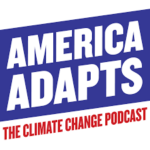
“Adaptation is such an evolving field. If anyone says they know exactly what they’re doing, they’re lying to you. But that’s what makes it so exciting—you can influence it.” —Doug Parsons.
Listen Now!
Why Climate? Featuring Justin Baumann
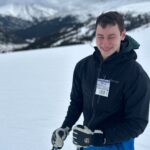
What about you? Why are you passionate about climate change work? Let us know by email radio @ clitizensclimate.org
Jobs of the Future
In this episode, we leap into the future. What will the job market look like in a world profoundly shaped by climate change? This radio play originally aired on the Climate Stew podcast and offers a humorous yet thought-provoking look at how engineers may be future celebrities.
Hot Mess: How Climate Consensus Turned Into Political Chaos
Mark your calendars! We are excited to announce our upcoming six-part series, Hot Mess: How Climate Consensus Turned Into Political Chaos. Premiering on Friday, November 1, 2024, this series explores how the united global concern over climate change unraveled, stalling progress. We’ll take you behind the scenes, revealing overlooked moments and heroes of the climate movement and the forces that drove political chaos.
Production Team:
Written and produced by Peterson Toscano, Tamara Staton, Dana Nuccitelli, and Elise Silvestri.
Technical support by Ricky Bradley and Brett Cease.
Music by Epidemic Sound.
Join the Conversation:
Follow and engage with us on X (@citizenscradio,) Instagram (@citizensclimateradio,) LinkedIn, Facebook, and TikTok (@climatechangepodcast.)
Call or text our listener voicemail line: (619) 512-9646 (+1 if calling from outside the USA).
Email us at radio @ citizensclimate.org.
Transcript
SPEAKERS
Doug Parsons, Peterson Toscano, Justin Baumann, Timothy Meadows, Announcer
Peterson Toscano 00:00
Welcome to Citizens’ Climate Radio, your climate change podcast, we highlight people’s stories, celebrate successes and share strategies for effective climate communications. I’m your host, Peterson Toscano , and this is episode 100. In today’s episode, we’ll hear from Doug Parsons, host of the America Adapts podcast. His show is about the critical role of adaptation in our climate response. We’ll also feature our Why Climate? segment, and stay tuned for a special feature from the future about what jobs might be available in our rapidly changing world.
Peterson Toscano 00:44
When we talk about climate change, we often focus on how we can stop it, but what about the changes that are already happening: wildfires, floods, sea level rise? How do we deal with those? That’s where climate adaptation comes in. Doug Parsons, host of the America Adapts podcast, joins us today to explain what climate adaptation is and why it’s essential.
Doug Parsons 01:10
No one is like the official boss of what’s climate adaptation. I look at climate adaptation as sort of the umbrella issue you’re adapting to the impacts of climate change resilience. And resilience planning is trying to make a community. It’s trying to make a state, or whatever, more resilient to the impacts of climate change. And resilience might be like, Okay, well, the city of Phoenix is going to plant a lot more trees to deal with extreme heat. You’re making that city more resilient to extreme heat right now, an issue that’s coming up on my podcast a lot is, How do you look into the future? And that’s so hard to communicate to people, because when they see something like by 2070, we’re going to have three feet of sea level rise, or we’re going to have this much increase in wildfire. That means nothing to most people. Even up to the year 2069, people be like, What? What happened was it increased. It’s very difficult to communicate these issues, and anyone dealing on either side, mitigation or adaptation, we’re already in a hole when we’re trying to communicate to the public, because when you talk about those future scenarios, people check out. They can’t visualize that. They can’t understand how that’s going to happen over time.
Peterson Toscano 02:15
Doug sees adaptation as more than just a technical fix. It’s about resilience, yes, but it’s also about making tough choices. Some places won’t be able to be saved. Take Miami, for example.
02:28
People in Miami might not agree with me, but when you have 6,7,8 feet of sea level rise, you’re going to have to abandon some areas. You’re not going to make it more resilient. And there’s something called “managed retreat.”
Peterson Toscano 02:40
The concept of managed retreat moving people away from areas they can no longer be protected. Might sound extreme, but it’s a reality we may need to face, and some people are already facing at the same time, there are opportunities here too, and Doug sees climate adaptation as a field full of potential for growth and new careers.
03:04
You not only can get jobs in this growing area, but you can influence it. You can be a leader in that space. And that’s a really satisfying thing. And it just, you know, crosses from high tech jobs to agricultural jobs to social service jobs, jobs of the future, and in every aspect of it that so the legal jobs of the future, how you’re going to be dealing with people, how the economy is going to react to people moving. There could be a job the future where, you know, parts of Florida have been abandoned. What are you going to do with those abandoned areas? And so there could be money made to, you know, salvage those areas. But then there’s going to be lots of growth in northern states, and we’re already seeing some of that as real estate speculation. People are investing in land in Minnesota and Wisconsin, thinking that people are going to be moving there.
Peterson Toscano 03:50
Adaptation is still a relatively new field, which means it’s full of opportunities for people looking to make a difference. Whether you’re interested in urban planning, agriculture or even national security. Climate adaptation offers a wide range of possibilities. And as Doug explains, it’s not just environmental work anymore.
Doug Parsons 04:11
You have like the whole ESG, right? That’s in the corporate world. You have sustainability, which has been around for a long time. Some people think sustainability and adaptation are the same thing. No, there’s overlap, but they’re two different sectors. Adaptation is its own sector. And for a young person, and I talk to a lot of young people, they actually reach out to me on the podcast. They’re like, I found your podcast. People are doing really cool things in adaptation. How do I get involved? And there aren’t actually a lot of university programs in climate adaptation, but increasingly you’re seeing more University coursework. So that’s a good sign. We will start seeing a lot more. Like, you get an undergraduate degree in climate adaptation, you have a couple of those, but you don’t have many, but you have a lot of coursework. So that’s great. And so I tell them like, you know, there’s universities, there’s tons of. Investors working on these areas. It’s an exciting time.
Peterson Toscano 05:03
Doug paints an inspiring picture a rapidly growing sector with room for innovation and leadership. If you’ve been thinking about where you fit into the climate conversation, adaptation could be your answer. Doug even has some advice for those wanting to dive in.
05:19
If you’re doing climate adaptation. I’ll go to a conference and such. You talk to people, and they think everyone knows about climate adaptation. Oh, my God, this is old news, but no, no one knows. You go out, walk into a mall and ask 100 people if one person understands what climate adaptation is, you’re lucky. It is still just scratching the surface, and so as a young person, do your homework. This is an emerging area and it’s it’s its own sector, so don’t ever forget that there’s climate mitigation, there’s climate adaptation, and there’s opportunities that are just opening up literally every day, and adaptation just sometimes people don’t realize that they’re out there. I encourage you even to reach out to me. I’m very accessible. I love talking to people about these issues and brainstorming areas that they might be able to go in. But adaptation is such like an evolving field, quickly evolving. If anyone says they know exactly what they’re doing in adaptation, they’re lying to you. It’s still trial and error. There’s still a lot of sausage making. You can get in and you can influence. And that is so satisfying, and that creates so much energy if you’re trying to get into this space,
Peterson Toscano 06:20
If you’re looking for your next step in the climate movement, climate adaptation is an exciting and rapidly evolving field. Whether you’re a student, mid-career professional, or just curious about the future, this field will only continue to grow.
Doug Parsons 06:35
There’s all these different fields out there in the environmental space, and increasingly, adaptation is not even considered environmental work. You can actually influence this field. You need to do the mitigation side. You need to get carbon and you need to get those emissions down, or we won’t be able to adapt to climate change. It’ll just get out of our control. But even if all the missions stop today, we will be adapting to the impacts of climate change for hundreds of years.
Peterson Toscano 07:10
Doug Parsons, host of America Adapts podcast. It is an excellent show, and definitely one of the best sources of information about climate change adaptation. America Adapts is available wherever you get podcasts or visit americaadapps.org Thank you Doug for being on Citizens’ Climate Radio and for being such a great supporter of our show, and thank you for also introducing me to our next guest. It’s time for our why climate segment, where we ask climate action figures why they’re passionate about this work. Today we hear from Justin Bauman. Justin talks about his passion for combining technology with community care. He shares how climate change once felt distant and overwhelming but has since become a key focus in his studies and career.
Justin Baumann 08:07
I’m Justin Baumann. I’m a fourth year engineering management major at Stevens Institute of Technology, and I’m super passionate about combining technology and people, which sounds really hard to do, and it sounds hard to find a major that fits that. But luckily, at Stevens, I found engineering management, which you take the name and you break it apart, you have engineering, which is my love for stem and then management, which is my love for people. And I would say my love for people Trumps that of technology. But still, they’re head and head for me.
Peterson Toscano 08:33
What are other identities that you have that are important to you, that you’d like people to know about?
08:38
In terms of identities, I feel like organizations that have become part of become like personality traits. That’s very much so who I am, being part of a fraternity, joining it early on, I really enjoyed that. But also, you know, I would say I’m culturally Jewish as well, right? I was raised not extremely religious in any way, but I was a Bar Mitzvah. But then as I grew into more of my adult life, I realized that maybe religiously, I’m not extremely devout, but when it comes to the culture and the morals behind it, I do heavily believe in that right and kind of the morals of giving back to your community and also using those holidays as a way to just interface with family friends. That’s kind of what I truly resonated with. And through some of those morals, I guess I try and be active in my community around me.
Peterson Toscano 09:21
Climate change seems to be something that you are engaged with. Describe your relationship with climate change.
Climate change is something that felt very unattainable to get involved with. It wasn’t until later in my college career where I realized engineering, or environmental engineering, was an option for students to get, you know, involved with. And up until, you know, the inception of this summer, I hadn’t been able to connect with it on the degree that I would have liked. It’s always been something that brought me immense anxiety, right? If you’re at all cognizant, especially as a young person in the world, you realize the implication. That it has, and you see what it does to the world around you. It’s quite hard to be able to deny its imminence when you look up and you can’t see the stars, I guess is a great anecdote.
Justin Baumann 10:11
Yeah, I was able to connect with it way more through an opportunity from a random email from my advisor about the waterfront conference at the beginning of the summer, cool conference that seems to encapsulate all of the professional and social and political issues and get it all into one day of like adrenaline shot of knowledge about these topics, right? Something that at least in my school, you know, it’s hard to learn interdepartmentally. So going to this conference, I filed, you know, my scholarship application, and I was accepted as a waterfront scholar, and that gave me a really awesome opportunity to glimpse into this field, which I had felt I had otherwise missed my chance to get involved with the idea of being able to apply my degree to making more resilient communities is extremely exciting to me. Ideally, I make a career out of something in some way, shape or form related to this.
Justin Baumann 11:02
Last summer, I worked for a company that was ranked as the number one most sustainable company in the world. I worked as a field engineer for Schneider Electric as a system application engineer, which was wonderful, but at the same time, I was not directly contributing to that. I was not working the supply chains that were efficient, and I was not working in production facilities that were clean. Instead, I was a cog, which was great, though I was a cog for a clean machine, but going into my future, I would love to have a more direct impact on communities. Right now, I’m pursuing my waterfront edge design guidelines certification from the waterfront Coalition, which is awesome, and I can’t wait to obtain that credential so that ideally, in the future, I can work somewhere bigger.
Peterson Toscano 11:45
Thank you, Justin. I’m curious to see where your path leads you, and for you listening, if you want to share the reasons why you are engaged in climate change work, email me. That’s do now let’s fast forward to the future and world where the effects of climate change have reshaped the job market. What are the careers of tomorrow? This segment originally aired on the climate stew podcast, and it offers a lighthearted look at future celebrity jobs.
Timothy Meadows 12:28
I am Timothy Meadows. It is Saturday, January 26 2165 and time for that day in climate history, the 21st century was the golden age of celebrities, not only colorful personalities from the world of cinema, television and music, dominated the news, but celebrity chefs, home decorators and fashion designers were their colorful lives, delighted and distracted the public from the growing fears and realities of a changing planet. The most unlikely celebrities to emerge in the late 21st century was the trio of engineers known as the three beans. Les trois haricots. The media dubbed them the three beans because of their unorthodox and inventive use of beanbag technology. Pierre Tembly, a civil engineer from Canada, Marcella Aguilar, a structural engineer from Mexico, and Sunday Mwanamwambwa, an environmental engineer from Zambia, were responsible for some of the most ambitious and creative building projects of their time.
Timothy Meadows 13:26
For example, their elegant and functional flood walls in lower Manhattan not only protected the city from rising tides and storms. With these walls, the three beings also created community whimsical benches designed into the levees, created spaces where friends or strangers chatted, large, low, round structures not only served to store emergency supplies, but also as tables where families gathered for reunions, business professionals met and activists organized the three beans also designed 1000s of projects throughout southern Europe, Northern Africa and the Pacific Islands, using and developing inexpensive materials to build shelters for disaster relief and permanent structures to withstand extreme weather.
Timothy Meadows 14:15
The three beans also provided endless entertainment with their flamboyant fashion choices, often wearing matching outfits, their lively interactions in public and the festive atmosphere they generated wherever they went, kept them regularly in the news for nearly 30 years during the Parisian flash floods of 2073 standing in front of the louver Pierre famously cut off his and his fellow engineers trousers exactly two centimeters below the knee before dashing into the famed art museum with their patented inflatable waterproof containers, thus saving priceless pieces of art. What was once called pirate pants became the fashion craze forever known as le Coupe de Pierre. Wherever they went, the three beans injected play and beauty into their innovative and highly effective adaptation designs on this day in 2165 we remember that day in climate history.
Announcer 15:23
Climate History is brought to you by Geico! 15 minutes could save you 15% or more on disaster insurance. Ask us about our Apocalypse plan.
Peterson Toscano 15:35
Before we wrap up, I have a special announcement on Friday, November 1, 2024 we are launching our brand new series hot mess how climate consensus turned into political chaos. It’s a six part series where we dive into the surprising history of how climate change action stalled and why we’re not just telling the well known stories we’ll hear about the hidden moments and unsung heroes who fought hard for solutions and yes, will expose some of the forces that shifted the momentum from global climate consensus to the political chaos we face today. In the USA, you’ll meet climate heroes from both sides of the political aisle. We’ll also uncover some of the lies that misled lawmakers and the public, leading to missed opportunities. Hot mess of climate consensus turned into political chaos. November 1, you won’t want to miss this.
Peterson Toscano 16:42
Thank you for joining me for episode 100 of Citizens’ Climate Radio. I know it’s the 100th episode. People were asking, are you gonna do something special? And I’m like, you know, every episode is special to me. I don’t know. I’m what’s really special is that you’re listening and that you’re sharing the show and that the audience is growing. So thank you.
Peterson Toscano 17:06
I’m your host. Peterson Toscano, I write and host the show, along with Elise Silvestri. Other technical support comes from Ricky Bradley and Brett Cease with social media assistance from Flannery Winchester. The music on today’s show is from Epidemic Sound. Don’t forget to follow us on Instagram, X, LinkedIn, Facebook and Tiktok, and if you have thoughts or stories to share, call or text our listener. Voicemail line, 619-512-9646, plus one, if you’re calling from outside the USA, that number again, is 619-512-9646, you could also send me an email podcast at Citizens climate.org visit CCL USA org, slash radio to check out our show notes and find links to our guests. Citizens’ Climate Radio is a Project of citizens, climate education. You

